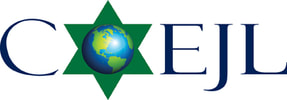Water.
By recognizing our dependence on water, and ultimately our dependence on God, Jews can strengthen our appreciation and protection of our precious natural resources, and our relationship with the Creator of the world.
Even before the Israelites entered the land of Israel, water was central to their collective experience. In the desert, uncertainty about water resources inspired numerous complaints and lessons for the wandering Jews. The Talmud teaches that in the merit of Miriam’s song, a well appeared in the desert which accompanied the Jews wherever they went (Tractate Ta’anit 9a). God gave us this essential resource, without which we could not live for more than a few days, in the water-scarce desert. But in the desert the long-term security of the resource was never certain.
Jewish prayers and texts reinforce this message and remind us of what our ancestors knew about water. Our prayers and texts are replete with appreciation for rain, profound recognition of the importance of water, prayers imploring God to provide us with water, and gratitude for the rains when they come. For example, Dr. Jeremy Benstein notes that Biblical Hebrew contains at least six different words to describe liquid precipitation (geshem, matar, yoreh, malkosh, revivim, se’irim), which denote different times and intensities of rainfall.
Today, the industrialization of water distribution has increased the availability of water yet reduced our appreciation of its importance. We generally do not see where food is grown or the rain or irrigation that waters the crops. Piped water now comes directly to us, replacing reliance on local water sources.
These innovations have relieved us from the burden of transporting water from streams and cisterns to our homes. However, they have blinded us to where water our comes from—both physically and spiritually. With this, we have lost the deep-seated experience of the preciousness of water. For many, this is partly a spiritual loss: lacking the sense of our ultimate dependence on God for all our needs. But it also has very significant practical impacts, because where appreciation ends, misuse begins.
The world increasingly faces a water crisis, experienced most by those in Africa, South Asia, and China. A lack of sufficient drinking water is recognized to be a leading cause of death in the world. Piped water and irrigated fields give us the misimpression that the availability of fresh water is virtually limitless, yet freshwater is scarce on planet earth. And the scarcity is growing every day as we face increasing demand, climate change, and pollution of freshwater supplies.
For modern use of water to continue in the long-term, we will have to develop a deeper water awareness. That is where the teachings of our 3000-year old tradition come in. These teachings on rain and water can help us cultivate an appreciation for water, and inspire us every day to value and protect our resources — and everything we use.
Source: Rabbi Yonatan Neril and the Jewcology Project
Even before the Israelites entered the land of Israel, water was central to their collective experience. In the desert, uncertainty about water resources inspired numerous complaints and lessons for the wandering Jews. The Talmud teaches that in the merit of Miriam’s song, a well appeared in the desert which accompanied the Jews wherever they went (Tractate Ta’anit 9a). God gave us this essential resource, without which we could not live for more than a few days, in the water-scarce desert. But in the desert the long-term security of the resource was never certain.
Jewish prayers and texts reinforce this message and remind us of what our ancestors knew about water. Our prayers and texts are replete with appreciation for rain, profound recognition of the importance of water, prayers imploring God to provide us with water, and gratitude for the rains when they come. For example, Dr. Jeremy Benstein notes that Biblical Hebrew contains at least six different words to describe liquid precipitation (geshem, matar, yoreh, malkosh, revivim, se’irim), which denote different times and intensities of rainfall.
Today, the industrialization of water distribution has increased the availability of water yet reduced our appreciation of its importance. We generally do not see where food is grown or the rain or irrigation that waters the crops. Piped water now comes directly to us, replacing reliance on local water sources.
These innovations have relieved us from the burden of transporting water from streams and cisterns to our homes. However, they have blinded us to where water our comes from—both physically and spiritually. With this, we have lost the deep-seated experience of the preciousness of water. For many, this is partly a spiritual loss: lacking the sense of our ultimate dependence on God for all our needs. But it also has very significant practical impacts, because where appreciation ends, misuse begins.
The world increasingly faces a water crisis, experienced most by those in Africa, South Asia, and China. A lack of sufficient drinking water is recognized to be a leading cause of death in the world. Piped water and irrigated fields give us the misimpression that the availability of fresh water is virtually limitless, yet freshwater is scarce on planet earth. And the scarcity is growing every day as we face increasing demand, climate change, and pollution of freshwater supplies.
For modern use of water to continue in the long-term, we will have to develop a deeper water awareness. That is where the teachings of our 3000-year old tradition come in. These teachings on rain and water can help us cultivate an appreciation for water, and inspire us every day to value and protect our resources — and everything we use.
Source: Rabbi Yonatan Neril and the Jewcology Project
